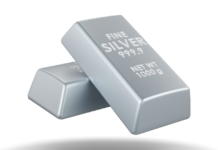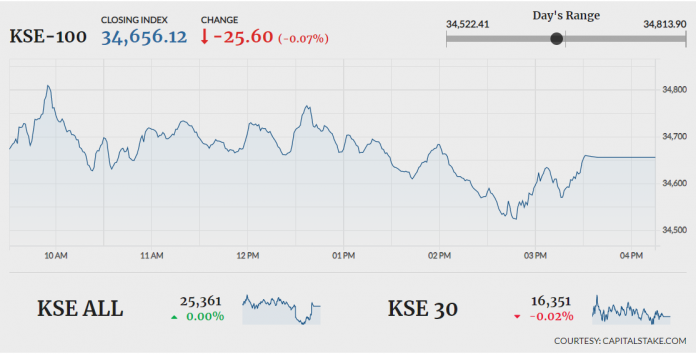KARACHI: Investors of the Pakistan Stock Exchange (PSX) endured a dull trading session on Wednesday, as the indices traded within a narrow range amid low volumes. Foreign investors continued with their recent trend, selling equity worth $2.87 million on Tuesday.
On the economic front, Pakistan’s trade deficit shrank by 13.6pc to $29.2 billion in 11 months of the current fiscal year, mainly due to a decline in imports. Exports had decreased marginally for the second successive month despite heavy subsidies for exports and depreciation in the value of the rupee.
Meanwhile, according to the State Bank of Pakistan (SBP), Foreign Direct Investment in different productive sectors of Pakistan fell to half at $1.60 billion in first 11 months of the outgoing fiscal year, as compared to $3.16 billion in the same period last year.
Gaining 132.18 points, the KSE-100 Index benchmark recorded its intraday high of 34,183.90. The index then oscillated in both directions to reach its day’s low of 34,522.41 (down by 159.31 points). It finally closed slightly lower by 25.60 points at 34,656.12. The KMI-30 Index gained 189.45 points to end at 55,435.38, while the KSE All Share Index only added 0.57 points to settle at 25,360.56.
Market volumes declined from 104.13 million in the preceding session to 99.35 million. Maple Leaf Cement Factory Limited (MLCF +0.28pc) led the volume chart with 14.13 million shares exchanging hands, followed by The Bank of Punjab (BOP -2.75pc) and Worldcall Telecom (WTL -1.32pc). The scripts had traded 12.82 million shares and 9.59 million shares respectively.
The automobile assembling sector lost 1.45pc from its cumulative market capitalization. Indus Motor Company Limited (INDU) was down by 3.38pc, Sazgar Engineering Works Limited (SAZEW) by -3.05pc, Honda Atlas Cars (Pakistan) Limited (HCAR) by -1.97pc and Millat Tractors Limited (MTL) by -1.19pc.
























FDI has registered a decline of nearly 50% overall in the 11 month period July 2018-May 2019, over the corresponding period last year, from $3.16 billion to $1.6 billion. This should come as no surprise because the biggest source of the FDI drop is China, from $1.83 billion last year to $495 million. That is the risk of reliance on one dominant investor.
In the communications sector (telecom, IT, postal and courier services) the overall FDI during the same 11-month period of July 2018-May 2019 has shrunk to $224 million, from $297 million last year same period, actually showing a negative FDI or outflow of $73 million.
The alarming decline in FDI indicate, firstly, that there is no clear-cut policy framework to offer attractive investment opportunities and incentives to investors.
Secondly, it demonstrates the total lack of improvement in the business climate and ease of doing business. Pakistan is ranked at 141 in world ranking of ease of doing business, much below the rank of India which improved its ranking from 131 to 100. In addition, the ping pong being played with the dollar-rupee exchange rate and the lethal mood swings of the government’s monetary and fiscal policies have taken their toll on the FDI.
A recent news report quoted Ehsan Malik, President Pakistan Business Council as stating that investors face delays of months just to get utilities connection to start their operations and therefore get frustrated due to the callous attitude of the slow and incompetent bureaucracy.